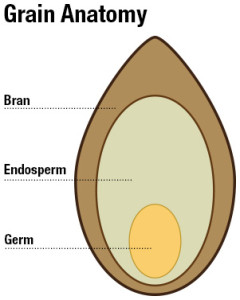Whole grains are a key component of a healthy diet, providing a powerful punch of energy, fiber, vitamins, minerals, phytochemicals, and key lipids and sterols. It’s no wonder that health authorities and experts recommend that we try to get at least 3 servings of whole grains per day. But across the United States and many European countries, most people are eating less than 1 serving per day and missing out on all the benefits whole grains can provide.
What are Whole Grains?
Whole grains include wheat, rice, oats, rye and other cereals that have not been milled or processed to remove the bran and germ, which contain most of the nutrients of the grain (the endosperm is predominantly made up of starch). The main reason why refined grains became popular in the last century was because by separating out the bran and germ, the resultant grain had a softer texture and a longer shelf life. However, we now know that compared to refined grains, whole grains provide more protein, fiber, calcium, magnesium, potassium, healthy fats and other vitamins and minerals.
Whole Grains for Vitality
The nutrients in whole grains are not only essential for life, but now new research suggests that it may actually help you live longer too! Two review studies published earlier this month reached the same conclusion that eating whole grains is associated with significant reductions in the risk for premature death.
In one report, published in the British Medical Journal by researchers from the Imperial College London, study participants who consumed the most whole grains had a reduced risk of dying from cancer, coronary heart disease, respiratory disease, infectious disease and diabetes 1. The analysis used data from 45 studies and showed that compared to individuals eating no whole grains, those who consumed at least 90 g/day had a 17% reduced risk of premature death. According to the scientists, even moderate increases to whole grain intake could significantly improve health outcomes.
The other study was a meta-analysis by researchers from the Harvard T.H. Chan School of Public Health which reported that the people who ate the most whole grains (70 g/day, or approximately 4 servings) had a 16% lower risk of total mortality, 18% lower risk of cardiovascular disease mortality and 12% lower risk of cancer mortality compared to those who ate little or no whole grains 2. This analysis pooled the data of studies taking place between 1970 and 2010, which included more than 786,000 participants across the United States, United Kingdom, and Scandinavian countries. Using the data, researchers calculated that if all the participants in the studies had consumed more whole grains, the observed mortality rate could have been reduced by 10% across the board.
Taken together, both of these studies emphasize the importance of including more whole grains in the diet and to replace refined carbohydrates with whole grains. Researchers believe the protective effects observed in these studies extend beyond the high fiber content, and may be attributed to the numerous bioactive compounds found in the bran and germ of the grain 3. Furthermore, the nutrients in whole grains are believed to work synergistically to achieve health-promoting effects 4, which is why it is important to get all of the nutrients in whole grains together.
 TRE-EN-EN
TRE-EN-EN
The world’s first only whole grain lipid and sterol supplement proven to enhance energy and vitality by optimizing cell membrane function.*
*These statements have not been evaluated by the Food and Drug Administration.This product is not intended to diagnose, treat, cure or prevent any disease.
Click here for more information and find out why thousands of people across North America are saying the NeoLife Web Health Talk is a half hour that changed their life! If time is money, that’s money well spent.
References:
1) Aune D, et al. Whole grain consumption and risk of cardiovascular disease, cancer, and all cause and cause specific mortality: systematic review and dose-response meta-analysis of prospective studies. BMJ. 2016 Jun 14;353:i2716.
2) Zong G, et al. Whole Grain Intake and Mortality from All Causes, Cardiovascular Disease, and Cancer: A Meta-analysis of Prospective Cohort Studies. Circulation. 2016 Jun;133:2370-2380
3) Fardet A. New hypotheses for the health-protective mechanisms of whole-grain cereals: what is beyond fibre? Nutr Res Rev. 2010 Jun;23(1):65-134.
4) Slavin J. Why whole grains are protective: biological mechanisms. Proc Nutr Soc. 2003;62:129-134.
